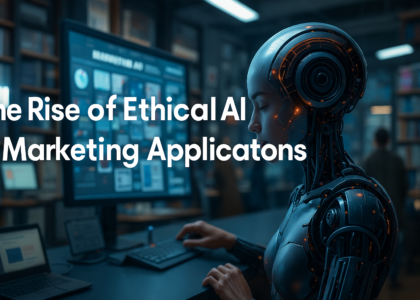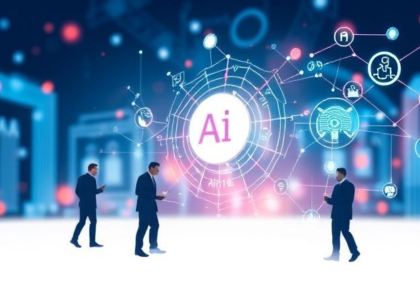Market research has always been a cornerstone of business success, helping companies understand consumer needs, track competitors, and anticipate market shifts. However, traditional market research methods often fall short due to time constraints, high costs, and the complexity of analyzing vast amounts of data.
Artificial Intelligence (AI) is revolutionizing market research by automating data collection, processing, and analysis, allowing businesses to make faster and more accurate decisions. AI-driven insights provide a competitive advantage by uncovering hidden patterns, predicting future trends, and enhancing customer engagement strategies.
Understanding AI in Market Research
AI in market research refers to the use of machine learning, natural language processing (NLP), and predictive analytics to analyze data more efficiently. AI can process vast amounts of information from multiple sources, identify trends, and provide actionable insights in real-time.
Key AI technologies used in market research include:
- Machine Learning (ML): Enables computers to learn from data and make predictions.
- Natural Language Processing (NLP): Helps analyze text data from surveys, reviews, and social media.
- Predictive Analytics: Forecasts market trends and consumer behavior using historical data.
- Computer Vision: Analyzes images and videos for insights into branding and consumer preferences.

The Role of AI in Competitive Intelligence
Competitive intelligence involves gathering and analyzing data about competitors to make informed business decisions. AI enhances this process by:
- Tracking Competitor Strategies: AI tools can analyze competitors’ digital footprint, including social media activity, pricing changes, and customer feedback.
- Real-Time Market Monitoring: AI continuously monitors industry trends and provides updates on shifts in consumer demand.
- Trend Forecasting: AI identifies emerging trends before they become mainstream, helping businesses stay ahead of the curve.

AI-Powered Consumer Insights
AI helps businesses gain a deeper understanding of their customers by analyzing data from various sources, including social media, website interactions, and purchase history. Benefits include:
- Enhanced Customer Profiling: AI categorizes customers based on behavior, preferences, and demographics.
- Personalized Marketing Strategies: AI-driven recommendations help brands create targeted campaigns.
- Case Study: Companies like Netflix and Amazon use AI to analyze viewing and purchasing habits, leading to highly personalized user experiences.

Predictive Analytics for Market Trends
Predictive analytics leverages AI to anticipate future consumer behavior and market shifts. Businesses benefit by:
- Optimizing Product Launches: AI predicts demand for new products based on historical trends.
- Strategic Business Planning: Companies adjust strategies based on AI-driven predictions.
- Example: Retailers use AI to anticipate seasonal demand fluctuations and stock inventory accordingly.

Sentiment Analysis & Social Listening
Sentiment analysis uses AI to understand how consumers feel about a brand, product, or service by analyzing online reviews, social media comments, and customer feedback. Benefits include:
- Brand Perception Analysis: AI identifies patterns in positive and negative feedback.
- Real-Time Feedback Loops: Companies can adjust their offerings based on consumer sentiment.
- Case Study: Starbucks uses AI-powered sentiment analysis to tailor promotions and improve customer satisfaction.

Automated Data Collection & Processing
Traditional data collection methods are labor-intensive and time-consuming. AI streamlines this process by:
- Automating Surveys and Polls: AI chatbots conduct real-time surveys and gather customer opinions.
- Analyzing Focus Group Discussions: AI transcribes and analyzes spoken data from focus groups.
- AI Tools for Real-Time Analytics: Platforms like IBM Watson and Google AI provide instant insights from large datasets.

AI in Competitive Pricing Strategies
Pricing strategies are crucial for maintaining market competitiveness. AI helps businesses optimize pricing by:
- Monitoring Competitor Pricing: AI tracks pricing changes in real-time.
- Dynamic Pricing: AI adjusts prices based on demand, competition, and customer behavior.
- Case Study: Amazon’s AI-driven pricing strategy continuously updates product prices to maximize profits and customer satisfaction.

Enhancing Customer Experience with AI Insights
AI enhances the customer experience by making interactions more personalized and responsive. Key areas include:
- Personalized Recommendations: AI suggests products based on customer preferences.
- AI-Powered Chatbots: Virtual assistants provide instant customer support.
- Example: Sephora uses AI-driven beauty advisors to recommend products based on skin type and past purchases.

AI and Market Segmentation
Market segmentation divides consumers into different groups based on shared characteristics. AI improves this process by:
- Refining Customer Targeting: AI groups consumers based on behavioral data rather than just demographics.
- Data-Driven Segmentation Strategies: AI finds hidden patterns in consumer behavior.
- Example: Spotify uses AI to segment users based on music preferences and create personalized playlists.

AI in Product Development & Innovation
AI assists in product innovation by identifying market gaps and predicting consumer needs. Companies use AI for:
- Identifying Unmet Consumer Needs: AI scans online discussions to find consumer pain points.
- AI-Driven R&D: AI accelerates product testing and development.
- Case Study: Coca-Cola uses AI to develop new flavors based on customer preferences and market trends.

Overcoming Challenges in AI-Driven Market Research
Despite its benefits, AI in market research comes with challenges, such as:
- Ethical Concerns and Bias: AI models may inherit biases from training data, leading to inaccurate insights.
- Data Privacy and Compliance: AI must comply with regulations like GDPR and CCPA.
- Implementation Costs: Small businesses may struggle with the initial costs of AI adoption.

Future of AI in Market Research
AI will continue to shape the future of market research by:
- Advancing AI-Powered Decision-Making: More businesses will rely on AI for strategic decisions.
- Enhancing Augmented Intelligence: AI will work alongside human researchers rather than replacing them.
- Predictions: By 2030, AI-driven market research will be standard practice across industries.
Conclusion
AI is transforming market research by providing deeper insights, automating processes, and improving decision-making. Companies that leverage AI gain a competitive edge by predicting trends, understanding consumer behavior, and optimizing strategies. As AI technology continues to evolve, businesses that embrace AI-driven market research will stay ahead in an increasingly data-driven world.





